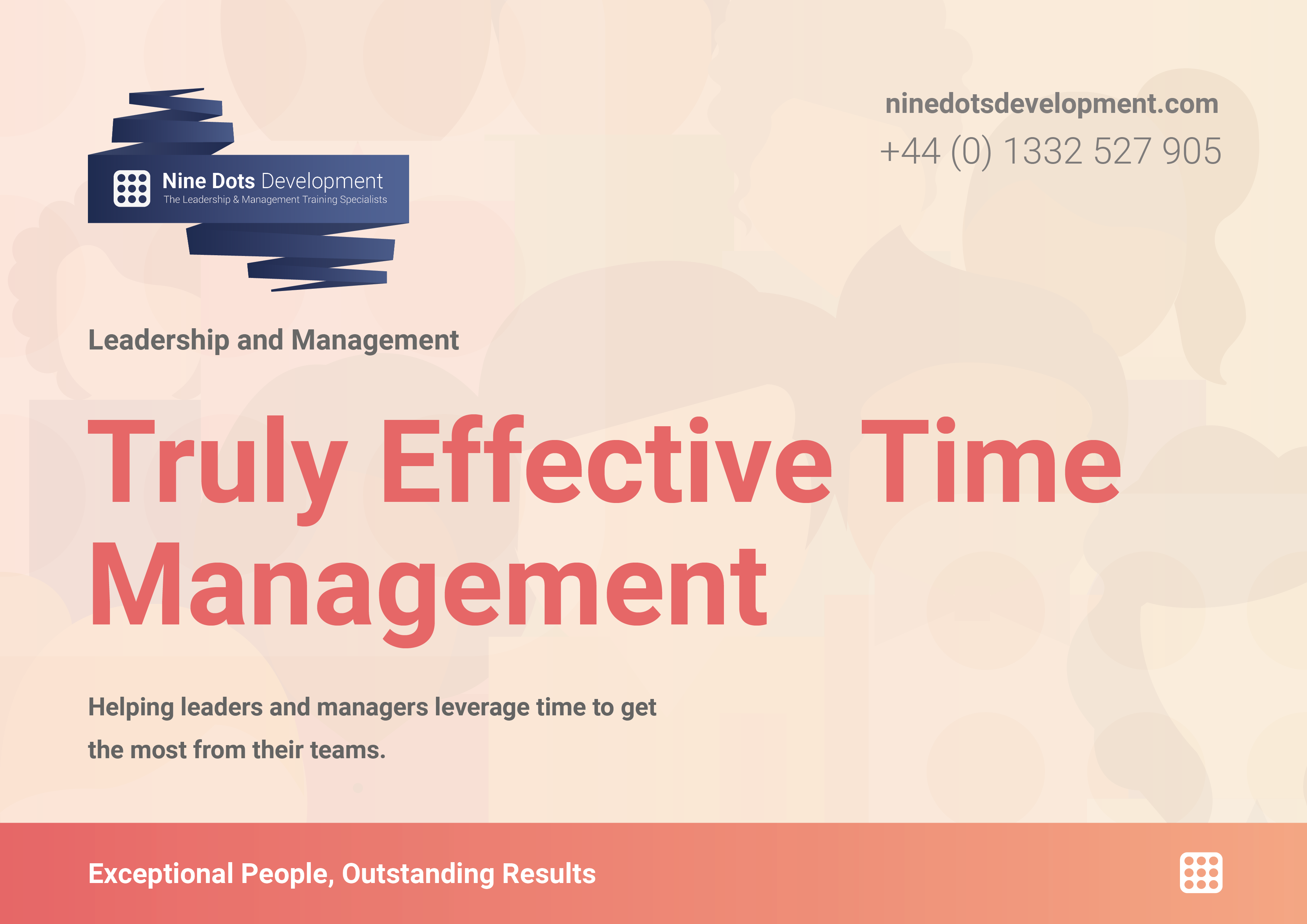Friday 24 Sep 2021 Article
The TakeawayThese Small Things Make a Big Difference
Struggling with Time Management?
Part 5
#PrivateTraining #Time #TrulyEffectiveTimeManagement #PersonalDevelopment
The perfectly matched resource for this article...
Our 'Truly Effective Time Management' Programme
If any of your managers or leaders struggle with managing and getting the most out of their own or their team’s time, our ‘Truly Effective Time Management’ programme would be perfect for them.
Download brochure!Playing catchup?
These Small Things Make a Big Difference
As we have emphasised throughout this article series so far, time is a precious commodity and using it wisely is the key to success.
- In the first article, we explored how planning both long and short term can help your staff save time.
- In the second article, we revealed a kick-ass way to get the most out of your staff’s time.
- In the third article, we discussed 9 ways your leaders and managers can leverage their employees’ time.
- In the fourth article, we explored what time allocation is and how it can make staff more productive and motivated.
Success isn’t built on procrastination and time-wasting, it’s built on action, efficiency, and using time wisely.
In today’s article, we identify 3 ways that your staff might be wasting time every day without even realising it, and what you can do to combat this.
1. Falling into Common Time Traps in the Office
Whilst offices are meant to take away the distractions of working from home, they come with their own unique time-wasting traps.
Whether it’s constantly checking emails, taking extended lunches, leaving slightly early, or attending unnecessary meetings, these small and seemingly insignificant amounts of wasted time quickly add up and once that time is lost, we can’t ever get it back.
Research shows that employees spend around 28% of their working time reading, responding to, or composing emails. If an employee works 8 hours a day, that means they spend around 2 hours and 15 minutes living in their inbox when more often than not, one inbox check per day is plenty.

And that’s just emails. If that staff member then also left 5 minutes early every day, took a 10 minute longer lunch break when they didn’t actually need to, and spent 15 minutes a day chit-chatting with colleagues, that’s another 30 minutes wasted every day, on top of the 2.25 hours spent in their inbox. This 2.75 hours of wasted time every day quickly adds up:
- 2.75 hours wasted per day
- 13.75 hours wasted per week (based on 5 working days per week)
- 60.5 hours wasted per month (based on 22 working days per month)
- 726 hours wasted per year (60.5 x 12)
In one of our previous articles, we explored common time traps in more detail and how leaders can save their staff from falling into them.
2. Being Addicted to Checking Their Phone
We have never had as much assistive technology as we do today but despite this, today’s workforce seems to have the least amount of time - one of the main causes of this is the use of mobile phones, which are designed to demand attention.
Studies show that on average, people check their phone 58 times per day - 30 of those times being during work hours!
Whilst the average time people spend on their phone when they check it is only around 2 mins, studies show that it takes staff 23 mins 15 secs (on average) to refocus after a distraction like checking their phone. Even more concerningly, research by AMA found that even brief interruptions can make employees lose as much as 40% of their productive working time.
Turning off notifications and physically putting phones away (for example in the staff room) can be really beneficial for reducing the temptation for staff to constantly check their phone.
{{ADVERT}}
3. Becoming a Slave to Social Media
As well as constantly checking their phone, a lot of people waste a concerning amount of time on social media. The average screen time for an adult in the UK per day is 3 hrs 23 mins and whilst this may not sound like too much time, it very quickly adds up:
- Daily: 3 hrs 23 mins
- Weekly: 23 hrs 41 mins (almost an entire day)
- Monthly: 94 hrs 44 mins (almost 4 days)
- Yearly: 1,136 hrs 48 mins (47 days)
The amount of time that some employees waste on these 3 things could be much better spent on furthering their career and professional lives, rather than wasting it by observing other people living their lives.
After all, you wouldn’t find successful people like Elon Musk constantly scrolling through Facebook - he’d more likely be investing his time into learning and taking his success even further. What really separates ‘good’ from ‘great’ people is their dedication to continuous learning and development.
Most, if not all, mobile phones have a Screen Time feature which not only shows how much time we spend on our phones as a whole, but also exactly what apps we are spending our time on. If you or your staff feel like there aren’t enough hours in a day, monitoring this Screen Time can be really useful for seeing where your time is going.
Want Your Staff to Use Their Time Better?
People naturally fall into patterns; if they get used to wasting time on these little things, they will always do so unless they become more aware of how they’re spending their time, and how to use it better.
Whilst employees can’t be expected to completely give up social media or never look at their phone, there are several ways that leaders can help staff use their time better.

One thing that leaders can encourage their employees to do to improve their awareness of how they spend their time is to ask them to keep a time log. Every hour, they should write down what they have done in the last 60 minutes, and they will soon realise how many, or how few, of those things are actually valuable and add to their life. Good time management is like a muscle - to build it, you need to consistently exercise it - so the more that employees analyse how they spend their time, the more self-aware they can become.
Another way of improving time management is through professional training. In our Truly Effective Time Management programme, we cover all of the essentials of better planning, managing, and getting the most out of time, including:
- Understanding what motivates individuals
- Confident motivation and delegation
- Monitoring and reviewing performance
- Creating and maintaining high performance teams
- Effective project management
To download our Truly Effective Time Management programme brochure, please click here.
---
Until next time...
Our 'Truly Effective Time Management' Programme
If any of your managers or leaders struggle with managing and getting the most out of their own or their team’s time, our ‘Truly Effective Time Management’ programme would be perfect for them.
Download brochure!Missed an article?
More from Struggling with Time Management?
